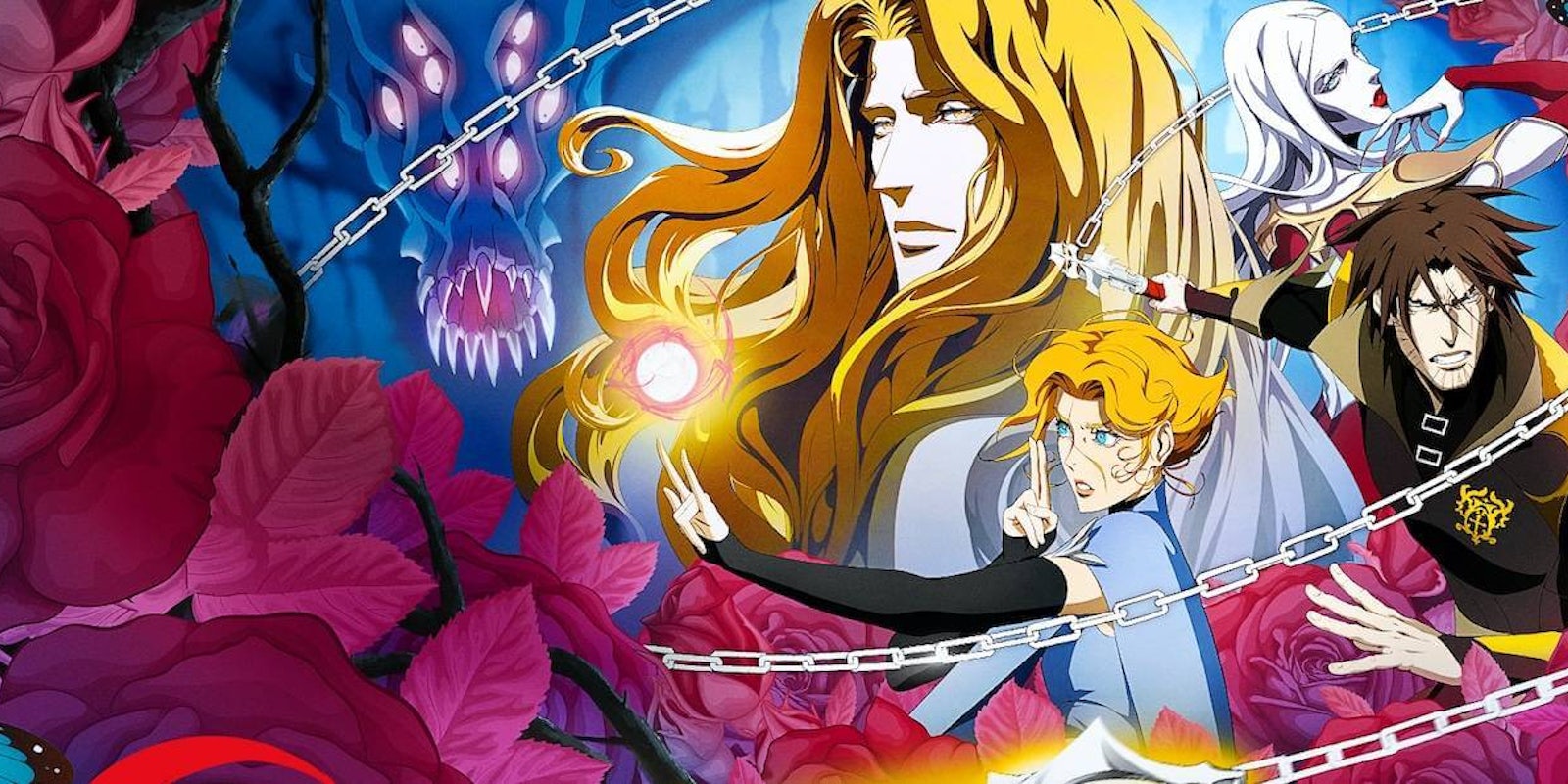Castlevania is remarkably different from most film and television adaptations of video games: it’s genuinely good, whereas the vast majority of others are notoriously mediocre at best. Yet since the truncated debut season of Castlevania (four parts that were originally written as a feature-length movie), the Netflix series has cleared an admittedly low bar in impressive fashion, thanks to clever writing, first-rate animation, and a willingness to simultaneously embrace and transcend its low-brow roots. The previous season’s finale may have fans wondering how the show would fare without Dracula (Graham McTavish), but season 3 proves writer Warren Ellis still has plenty on his mind.
STREAMING: Netflix
Despite pacing issues, ‘Castlevania’s third season continues to exceed expectations of video game adaptations with high production value, well-rounded heroes and villains, and sophisticated scripts by Warren Ellis.
Last season ended with a doozy. Dracula’s half-vampire son Alucard (James Callis)—his name, in case you missed it, is “Dracula” spelled backward—finally managed to drive a stake through the heart of the series’ co-lead, with the help of the prickly, perpetually-drunk vampire hunter Trevor Belmont (Richard Armitage) and Sypha Belnades, a bookish, yet adventurous spellcaster.
As such, season 3 kicks off in uncharacteristically upbeat fashion for Castlevania. Trevor and Sypha, now a romantic couple, roam from town to town seeking new adventures, cheerfully fighting monsters on a regular basis and barely breaking a sweat in the process. Alucard may miss his friends, but he cheers up after taking two young Japanese vampire hunters under his wing, siblings Taka (Toru Uchikado) and Sumi (Rila Fukushima). Between Alucard’s training montages and the world-traveling quests of Trevor and Sypha, this season is structured more like a video game than the show ever has been.
Of course, this is still a show about evil vampires hell-bent on killing and/or enslaving all humans. Mischievous vampire Carmilla (Jaime Murray), formerly a key figure in Dracula’s army before betraying him in service of her own unholy goals, reemerges this season as a lead villain. She’s joined by new characters Striga (Ivana Milicevic), Morana (Yasmine Al Matri), and Lenore (Jessica Brown Finley), all of whom bring distinct motivations and secret plans. Dracula’s human companions remain fascinating, wth Hector (Theo James) held captive by the quartet of vampire ladies, while fiercely misanthropic Isaac (Adetokumboh M’Cormack), having been unwittingly spared by Dracula in the midst of the castle’s destruction, roams the Earth planning his own vengeance against humanity.
As with previous seasons, the villains remain the most compelling characters in the series. Sure, “kill the humans/take over the world” is hardly original as far as evil schemes go, but it’s never that simple. The three new female vampires are an especially welcome addition to what had previously been a rather testosterone-driven show. Carmila shined in the previous season as a commentary on gendered power dynamics, so it’s fun to see the women take charge now.
It’s a remarkably well-written series, thanks almost entirely to Ellis, who continues to script each episode. Ellis is probably still best known as a comic book writer, and he imbues Castlevania with many of the tics that characterize comics like Transmetropolitan and Nextwave: dark humor, painted critiques of Christianity, and an abrasive leading man who secretly has a heart of gold. It remains a bit shocking to hear nuanced conversations about trauma and man’s inhumanity to man in a cartoon based on a video game franchise about killing “night creatures” with a whip, but Ellis is self-aware enough to explore loftier ideas without losing sight of the series’ origins.
Unfortunately, it’s all brought down by poor pacing. For a series about monster hunting, there’s remarkably little action. This wouldn’t necessarily be a problem if the slower moments did more to build tension, but too often it meanders. Most episodes are characterized by long conversations punctuated by short bursts of exquisite violence. As compelling as the dialogue is, there comes a point when you wish they’d skip to the part where vampires feast on human flesh. The pace picks up in the latter half of the season, but for many viewers, it may be too little, too late.
Luckily for patient viewers, there’s still a lot to like. The voice performances remain strong, as do the character designs, especially the monsters. The animation is more stunning than ever this season, including a jaw-droppingly psychedelic sequence aided by thrilling music and slick sound design.
Castlevania remains a compelling series with plenty of twists, turns, and even a few fights, but those hoping for more vampire-killing action may want to dust off Symphony of the Night instead.
Looking for something more specific? Here are our Netflix guides for the best war movies, documentaries, anime, indie flicks, true crime, food shows, rom-coms, LGBT movies, alien movies, gangster movies, Westerns, film noir, and movies based on true stories streaming right now. There are also sad movies guaranteed to make you cry, weird movies to melt your brain, old movies when you need something classic, and standup specials when you really need to laugh. Or check out Flixable, a search engine for Netflix.


